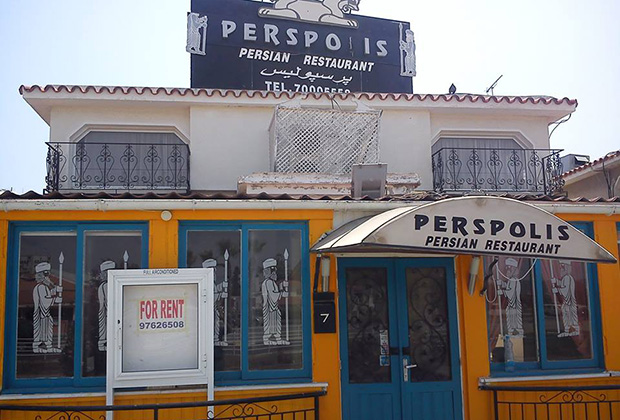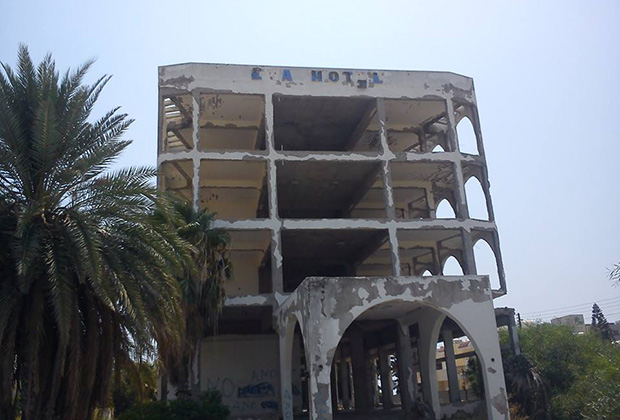- Leading HANAC: Stacy Bliagos on Community Service in New York
- The Hellenic Initiative Celebrates Record-Breaking Weekend in New York
- Building the Future: HANAC’s 53rd Anniversary Gala Honors Advocates for Affordable Housing and Community Care
- Leona Lewis: Las Vegas residency ‘A Starry Night’
- Emmanuel Velivasakis, Distinguished Engineer and Author, Presents His Book at the Hellenic Cultural Center
Another Challenge (and Opportunity) for the Divided Island of Aphrodite
As I walked through the Larnaca Airport this past July, Cyprus seemed exactly the way I had left it two years ago. The plane had made a slow descent over the dark Mediterranean waters, delicately curving onto the runway. I saw the sparkling lights in the distance, the same constellations of houses I had seen when I left last. The illusion of sameness was kept up when my family and I pushed through the doors into the pick-up area of the airport and we were greeted with warm hugs and kisses from members of my big and wonderful family. The heavy, humid summer air that enveloped me on the walk to the car felt just the way I remembered. It was like coming home.

The core volunteers with the author and her sister: Antonis Hadjiantonis, Eleni Efthimiou, Rea Hadjiharalambous, Anna Amyrotou, Alexa Nicolaou, Elena Nicolaou
Despite my immediate sensation that Cyprus was unaltered, save for one cousin’s growth spurt and another’s new facial hair, I knew the Cyprus I was arriving in was a different country than the one I had left. The grim newspaper headlines told me so in capital letters, the talks given at my university on the Cyprus crisis certainly pointed towards disaster. My American friends suddenly knew where Cyprus was, and some even professed to be experts in the financial crisis. It was strange for me to see the little Mediterranean island I spent my summers in gain so much publicity for something so tragic. Yet I knew I had to see this new, altered Cyprus for myself, to see how Cyprus had changed, and most of all, how it was affecting its people.

Volunteers talk, unload boxes, sort cans, and stock the shelves
My aunt led my sister and me to her car, a white Volkswagen sedan I had never seen before. It was spacious and new. She chuckled as she put our luggage into the trunk: “This is my pre-crisis car,” she said, explaining that she bought it the day before the haircut was announced. Her casual laughter revealed the surrealism of everything that has happened since March. Cypriots were shocked by the haircut and what the government did to their bank accounts. Now, it has become a sad reality, a laughable turn of events that people cannot quite believe. My aunt bought her car the day before the Cypriot people had to pay—literally—for the failures of their government.
The car, however, still shines and sparkles. It is, after all, only five months old. But, as has become blaringly obvious to both the people and spectators of Cyprus’s situation, five months can change everything.
Now, a new set of vocabulary is on the tip of everyone’s tongues. In the past, I remember constant and hushed talk of green zones and Turks. This year, words like haircuts, downturns, job loss and unemployment are passed around the dinner table like balls in a competitive ping-pong match. The economic crisis has scratched off the shiny veneer that Cyprus has gained over the years of economic prosperity. Though Mackenzy and Ayia Napa sparkle all day and boom all night long, that kind of lifestyle is not as accessible as it once was. Among the Finikoudes’ high-end stores sporting European-imported clothing or fine jewelry are many more closed shops unable to survive in this time in which people have no money to spend, let alone keep a store open.

A “For Rent” sign replaces a menu outside a closed restaurant, now a regular sight in Larnaca, Cyprus
I see the way that Cyprus has come to a halt since March 15, 2013 in the lives of my relatives, the blocks of empty windows in downtown Larnaca, the floundering and unemployed kids my age sitting around and waiting for the problems of Cyprus to be solved tomorrow, without their help or input. The streets of Larnaca are pockmarked with the angry, angst-filled graffiti of a generation that feels let down by its government. Empty storefronts line the streets, and many half-complete construction projects I saw two years are now abandoned. The visual effects of the crisis are certainly visible, but the demoralization of the people is perhaps the crisis’ most debilitating effect. On this island, hope is a precious and rare commodity.

An abandoned and decaying hotel sits on the waterfront in Larnaca, Cyprus
The change, I soon learned, was more than anything a destabilization. It was the sense of unease that crept into every household that had once been comfortable, or even prosperous. Since the haircut, no one feels secure or protected. The threat of job loss looms over people every day of the workweek, and now not even savings in the bank are protected. It’s a tremor deep enough for people to consider relocation, and I heard some stories from my cousins of classmates quietly not arriving to school one day, nor the next, nor the next. Certainly most young adults aspire to study abroad, and now plan to work abroad as well. My godparents are grasping at what countries their young children should attend university in; at this point, Cyprus is not a contender. Instead, they hope their children can study in Germany, the United States, or the U.K, and perhaps establish futures in those countries as well. The glue that holds Cypriots to their island is slowly breaking down, for the benefits of remaining in a country with little opportunity for future growth seem to be slim.

Volunteers work to sort canned goods at the food bank
I cannot speak of numbers and figures, nor can I state the details of the banks and bailouts and trauma to the economy. However, throughout my two weeks in Cyprus, I saw these numbers in the tired eyes of my relatives, in the shop-owners struggling to keep their stores afloat, in the volunteers at a local food bank. The people of Cyprus project a similarly negative vibe as the statistics. There is a feeling of staleness, of the last morsel of opportunity having sped out the door in March, leaving the people left behind to wait until things got better. But will they get better? Does Cyprus have a future?
For the 20-something recent university graduates, it seems that their future cannot possibly lie in Cyprus. The island that was their home for so many years is now a place barren of work or opportunity. I hear stories from my cousin, Nicolas Loizou, who is studying in Scotland—his Cypriot friends plan on remaining in Scotland even if they do not finish university, because there at least they can get a job.
I sat down with my 26-year-old cousin, Stavros Loizou, who lives in his parent’s house and has drifted from job to job since returning from school in England. His brother, Nicolas, is currently studying mechanical engineering in Scotland. Both men make a provocative statement: “Cyprus is only good for summer vacation.” If Stavros believes this to be true, then why is he still living in Cyprus? It comes down to the same answer given to me by my other cousins and people I interviewed. To put it plainly, leaving one’s home is extremely difficult, especially in a situation when a return date is not in sight. Though many young people have the desire to leave the island, it is increasingly hard for people to abandon their comfortable lives at home.
Without much exception, the adults I spoke to will readily admit that the younger generation is “spoiled” and not used to working hard. Though I am sure there is truth in their condemnation of the younger generation’s laziness, this crisis is asking a lot of the young adults caught in the middle of it. Children in Cyprus now have to deal with a reality that most youth of other modern European countries do not have to consider. Many will have to sacrifice a comfortable existence in their home and move abroad, far away from where their families and friends are. Yet, when crisis hits, working hard is the only option. Or is it? Without job opportunity in Cyprus, if one doesn’t leave, most of the time he isn’t working at all.

Stacks of pasta and rice line the shelves at the Aradippou food bank
In the face of this crisis, when I ask my cousins and their mother what advice they would give to other young Cypriots, they reply with the same grim answer: “Leave.” My cousin Nicolas is more optimistic about the prospects outside of Cyprus than within the island, saying that young people should “risk it, and try [their] luck outside of Cyprus.”
But are such drastic measures so necessary? Not all Cypriots think so. Some believe that staying in the country and their homeland is the healthier and more beneficial option. Cyprus is an island with deep-seeded traditions and values that are not conducive to this “brain-drain” type of migration.
Zacharias and Anna Amyrotou are scared for the future of their jobs, yet they do not fear for the teenage children’s futures in Cyprus. Just as there is a feeling of hopelessness for some Cypriot youth, others are confident that the situation in the island will recover in time for them to get work. Christos Amyrotou, their son currently serving his first year in the Cypriot Army, hopes that by the time he is ready to enter the work force, the situation will have improved. Zacharias has faith in Cyprus’s ability to recover from these hardships, saying that he is always hopeful, because after surviving war the economic crisis is nothing.
I got the impression that young people either wanted to leave Cyprus and find opportunity elsewhere, or remain in Cyprus and wait until the situation improved on its own, but no one was ready to dive in and try to help the country. A feeling of hopelessness covers the country like a blanket—the people do not trust their government, are angry at the rest of Europe, and feel betrayed. Neither staying nor leaving is a perfect option, but people certainly have to choose one, and soon.
My yiayia told me a story of a man who went into a bakery and told the workers he needed bread and milk for his five children who had not eaten in two days. The man walked out of the store without paying for the “stolen” goods, and soon the police arrived at his house to investigate the peaceful robbery. Sure enough, there were five children dipping bread into their milk and eating for the first time in days. Every day since, the bakery has been providing the man with bread and milk for his family, free of charge. This story has achieved a sort of urban legend status. After hearing her version of this story on the first day of my trip, many other people recounted a slight-tweaked version of the story. They use the story as a way to show us, the newly arrived Americans, just how badly living conditions in Cyprus have deteriorated since we were here last. Everyone knows the story of the nonviolent bakery robbery, perhaps because it embodies the Cyprus crisis so well. People were taken by surprise by the way the crisis has pushed some people to their knees.
Elena Nicolaou is a sophomore at Columbia University majoring in English. She is a member of the newly founded Cypriot Young Professionals of the Cyprus-US Chamber of Commerce and writes for the Columbia Spectator and NEO magazine.














0 comments